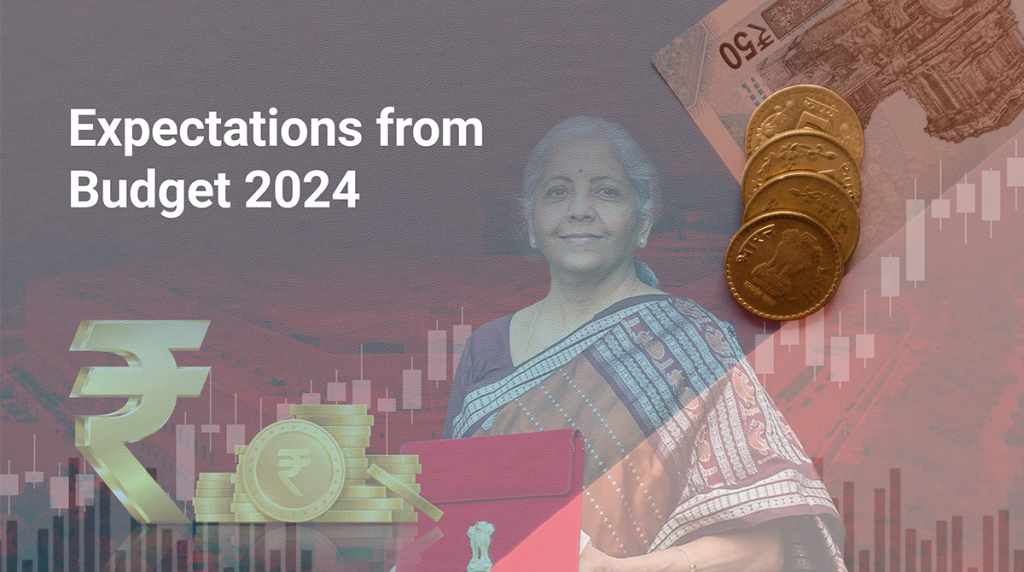The Indian Finance Minister presented the interim budget for FY25 in the parliament on February 1 ahead of the general elections. Now that the general elections are over, the budget is expected to come in July. What should you, as an investor, expect from the budget? In this article, we look at some of the key outcomes and expectations from budget 2024 and what investors should expect.
Budget and Market Volatility
Here are two things investors must make a note of ahead of the 2024 budget:
- Short-Term Fluctuations: The budget announcement can lead to short-term volatility in the stock market as investors react to policy changes and announcements. Expect some price swings in the days leading up to and following the budget.
- Long-Term Fundamentals: While there might be temporary volatility, historical data suggests that the Union Budget has little to no impact on the long-term stock market performance. Focus on your long-term investment goals and asset allocation strategy.
Will there be a change in the tax slab?
In the pre-poll budget speech, the finance minister said, “As for tax proposals, in keeping with the convention, I do not propose to make any changes relating to taxation and propose to retain the same tax rates for direct and indirect taxes, including import duties.” It means that there would be no addition or reduction in tax, which means that if your income and expenses remain the same, you will not be saving any additional amount through taxes.
The Finance Minister, in her previous Budget 2023-24, had hiked the income tax rebate limit under the new income tax regime to Rs 7 lakh from Rs 5 lakh. Similarly, the lowest exemption limit under the new tax slab was increased to Rs 3 lakh from Rs 2.5 lakh.
Change in capital gains?
Like every other year, this year also, investors expect a change in the capital gain tax regime. As per the current structure, the capital gains are taxed as below for equity:
- If the holding period is less than a year, capital gains fall under short-term capital gains (STCG) and are taxed at 15%.
- If the holding period is more than a year, the capital gains are taxed as long-term capital gains (LTCG) and taxed at 10%. However, your LTCG is exempted from taxation up to Rs 1 lakh for every financial year.
The finance minister may include tax breaks for long-term capital gains or tax exemptions for specific industries.
Change in lock-in period for 80C Deductions
A large section of investors is advocating for a revision in the lock-in periods under Section 80C for various investments such as National Savings Certificates (NSC), fixed deposits (FDs), and Equity-linked Savings Schemes (ELSS).
Currently, all these investments (and a few more) qualify for tax deduction under Section 80C, with lock-in periods. The period varies from 3 years (for ELSS) to 5 years (for FD and NSC). The expectation is to have a lower lock-in period to accommodate the investors’ liquidity needs. This adjustment would provide greater flexibility in managing their investments while enjoying tax benefits, thereby addressing their immediate financial needs more effectively. What are your thoughts on the same?
Sectors and Industries to focus
As an investor, you may want to know which sectors are expected to do well in the coming quarters because some announcements can be made around them. Let us look at the sectors the government may focus on during the budget.
The upcoming budget is poised to sharpen its focus on critical sectors such as:
Experts anticipate significant allocations and strategic initiatives aimed at fostering growth in these domains, aligning with India’s long-term development objectives under PM Modi’s third term. Expect priorities to include bolstering military capabilities, expanding infrastructure networks, modernizing railways, and advancing renewable energy initiatives and home loan financing defining the core themes of the budget.
Things to consider while trading around budget
If you plan to trade around budget, here are a few things you should consider:
- Global Economic Conditions: The Indian economy is not immune to global factors. Consider the broader economic situation and potential risks like inflation or interest rate hikes when making investment decisions.
- Earnings Season: The budget announcement often coincides with the earnings season for listed companies. Analyze company performance and future outlooks alongside the budget to make informed investment decisions.
Before you go,
We request to understand this – budget is just one piece of the puzzle. Utilize it alongside your existing investment strategy and conduct thorough research before making any investment decisions. However, most people cannot do it, and if you go to a battle without the required ammunition and skill, the outcome will not be on your side. So, if you can’t do all of it, use an AI tool for the stock market in India.
